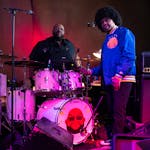HAVANA – There is one teacher of classical harp in Cuba. One. In a nation of 11 million people. Mirtha Batista has four students, who play on cheap Russian instruments, some of them slowly being devoured by termites.
So it was a true act of generosity when Kathy Kienzle and Ann Benjamin, harpists with the Minnesota Orchestra, sat down one afternoon in a hot side auditorium at Havana's Teatro Nacional, and let students play on the orchestra's instruments. The session was part of the ensemble's just-concluded historic trip, and of an intentional mission to mentor eager young musicians.
"There were some technical issues with their strength and evenness, but that has to do with them playing such terrible strings," said Kienzle. "There is a natural musicality in the students and we found them extremely expressive."
The harp has gotten a bad rap in Communist Cuba. It is regarded as an elitist instrument and the government does not consider it a priority when it comes to supporting and supplying symphonic materials.
In Havana, Kienzle and Benjamin met a young woman determined to change all that. Anabel Gutierrez will enter Indiana University next fall — the first Cuban harp student to study with legendary teacher Susann McDonald. In the small world of harp music, McDonald also taught Kienzle and Benjamin.
"My goal is to come back and create a harp department at our university for the arts," Gutierrez said in perfect English. "I want harp music to become a part of Cuban music."
One of the first things on her to-do list is to get proper instruments. Kienzle said the old Russian instruments make it difficult for players to find certain half-steps because the harp's structural integrity has eroded.
"I don't know what it is about the wood, but whatever it is, the termites really like it," Kienzle was told by the Cubans. "So they have lost some harps because of that."
Determined musician
Gutierrez is 24, old for a freshman entering an American university. How she got to this point, though, is a story rivaling any made-for-TV movie.
For two years she could not play because of focal dystonia, a neurological condition that caused involuntary contractions in her hands and fingers. Doctors told her she could not be a musician, a diagnosis she refused to accept.
"Everyone thought I was supposed to stop playing," she said.
She worked with a psychologist, who suggested that Gutierrez listen to a piece of favorite harp music and imagine playing it. The idea was to implant the music so deeply into her mind and nervous system that her hands would relax and respond.
Gutierrez chose a recording that McDonald, the Indiana professor, had made of Gabriel Fauré's "Impromptu" for harp in D-flat major.
"For six months, four times a day, I listened to the Fauré," Gutierrez said. "And when I met Susann McDonald, I told her, 'You are the person who cured me.' "
Kienzle said Gutierrez plays at a very high level, her only weakness being that her repertoire level is lesser than an American student of her age.
"She had eight months of lessons in Montreal with a very fine teacher, so I didn't really teach her much," Kienzle said. "A few technical things, with hand position, holding the left thumb higher, steady tempos. But she's had really good training."
That schooling includes lessons with Batista — sometimes for hours at a time.
"She is the best," Gutierrez said of her teacher. "We will work for three or four hours on a day, depending on how much we need."
The young musician hopes to play in a future International Harp Contest in Israel, one of the most prestigious international competitions for the instrument, and at the USA Harp Competition at Indiana.
Ultimately, she wants to be the harp's ambassador in Cuba. "These four students could become amazing," said Kienzle of Batista's mentees. "Mirtha asked Ann and I both to send letters to try to help get this program started at the university."
That would be one more legacy of a fruitful trip for the Minnesotans and the Cubans.
Graydon Royce • 612-673-7299






